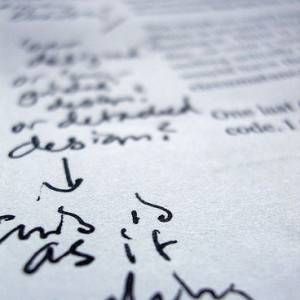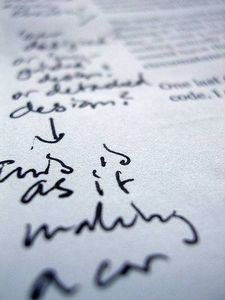
To Note or Not to Note: How Marginalia Changed the Way I Read

So the idea of marginalia – or writing notes or marking quotes – as an experience enhancer rarely crossed my mind. Until recently.
Rebecca, our fearless Riot Senior Editor, offered up her copy of J. Courtney Sullivan’s newest novel, The Engagements, to the first Rioter that wanted it. I pounced first, and as soon as I got it in the mail, I started tearing into the pages. Rebecca and I differ on our opinion of marginalia, though; she is a dedicated scribbler, constantly making notes in the margins and bracketing certain notable passages about the story as she reads, though some books get more notes than others. And The Engagements was no exception.
As I read Rebecca’s copy of the book, I started to notice how her notes changed the way I was reading. The passages she chose to mark, and the notes she wrote at the end of chapters, framed the way I was reading the novel. The overarching theme of the book examines the tradition of engagement diamonds, and of marriage in general, and as a single woman about to hit 30, I had ALL THE FEELS while reading. But reading the novel with Rebecca’s notes incorporated – Rebecca is my age, but happily married – forced me to slow down and consider a perspective beyond my own experience. And in doing so, my experience of the book was altered as well.
I’ve read books in the past with marginalia – usually used books that had previous owners unknown to me – and while those notes also pointed out passages to me that I otherwise may have skimmed over or which may not have been necessarily significant to me upon first glance, I never really paid attention to it beyond those pauses. My used copy of Fahrenheit 451 is a perfect example. Some previous owner who’d read the paperback I bought highlighted particularly great passages that forced me to consider the larger message of the book and the symbolism behind Bradbury’s story. But once I was done with the book, I was done with the notes.
This experience – of reading Rebecca’s copy of The Engagements – was markedly different, though. Because we’re not just Book Riot colleagues, but also good friends, not only was my perception of the novel changed, my perception of Rebecca – as a friend, as a woman, as a reader – was also changed. The subject matter of the book touched on conversations we’d had about getting older and about relationships, but as her friend, reading her notations, I got a rare glimpse that I feel lucky to have been offered. Things I knew about Rebecca, things I thought I knew, and things I had no clue about came through in her marginalia. And though the notes were sparse, the significance of what was noted held all the more significance.
A perfect example of this marginalia that forced me to stop and consider the text exists early in the book. In this passage, Rebecca underlined and starred the last sentence, bolded here: “The outside pressure to be married was intense. This had surprised her a decade ago, but now she thought she understood. People wanted you to validate their choices by doing the same thing they had done.”
I came across this line and hesitated. Did I want to get married eventually because that’s what everyone else is doing and what everyone expects me to do? Or do I actually want to be legally bound to someone for the rest of my life? I’m not sure that I would’ve paused in the text to ask myself such questions without that indicator. And that pause forced me to stop and consider Rebecca’s reasoning for highlighting such a passage as well.
About halfway through reading, I mentioned to Rebecca how her notes were changing my reading experience, and she said that she writes in books not thinking that anyone will ever read her notes, and opening her head like that feels so personal that she rarely loans out books with notes. The argument resonated with me immensely. If you process what you read by making notes, what you write is possibly the truest reflection of how you interpret books and your thought process when reading, as well as what resonates with you beyond the pages of the book. And loaning out books that hit you particularly hard would be like asking someone to read parts of your diary.
Even after I’ve finished The Engagements, reading Rebecca’s notes has changed the way I read other books. I’ve always shied away from note taking because it feels too close to an academic exercise – and I am absolutely one of those readers that balks when anything that’s supposed to be pleasurable feels like work. But, on suggestion from Rebecca, I decided to try starting my next read with a pen in my hand and to see what happened.
I read Jami Attenberg’s novel The Middlesteins, about food, comfort eating, relationships, and love in a Jewish family, that has a ton of implications for me personally. I wasn’t sure how it was going to affect me, and whether that impact would cause me to mark up my book, or how. But I started and read the whole thing with a pen in my hand. Did it work?
I didn’t write notes. But I did mark passages with brackets, the blue ink standing out against the printer faded pages. When I go back to it, if I go back to it, I’ll be able to find those parts that meant something to me upon first reading, by just flipping through the pages and looking for my marks.
A bracketed passage that stands out now as I flip through The Middlesteins? “Food was made of love, and love was made of food, and if it could stop a child from crying, then there was nothing wrong with that either.”
Perhaps it means little to you. But for me the connotation is profound.
Have you had this experience, of reading a friend’s marginalia and having it change the way you read? Or loaning out a book with notes and having the loanee remark on your thoughts?
____________________
Book Riot Live is coming! Join us for a two-day event full of books, authors, and an all around good time. It’s the convention for book lovers that we’ve always wanted to attend. So we are doing it ourselves.


















